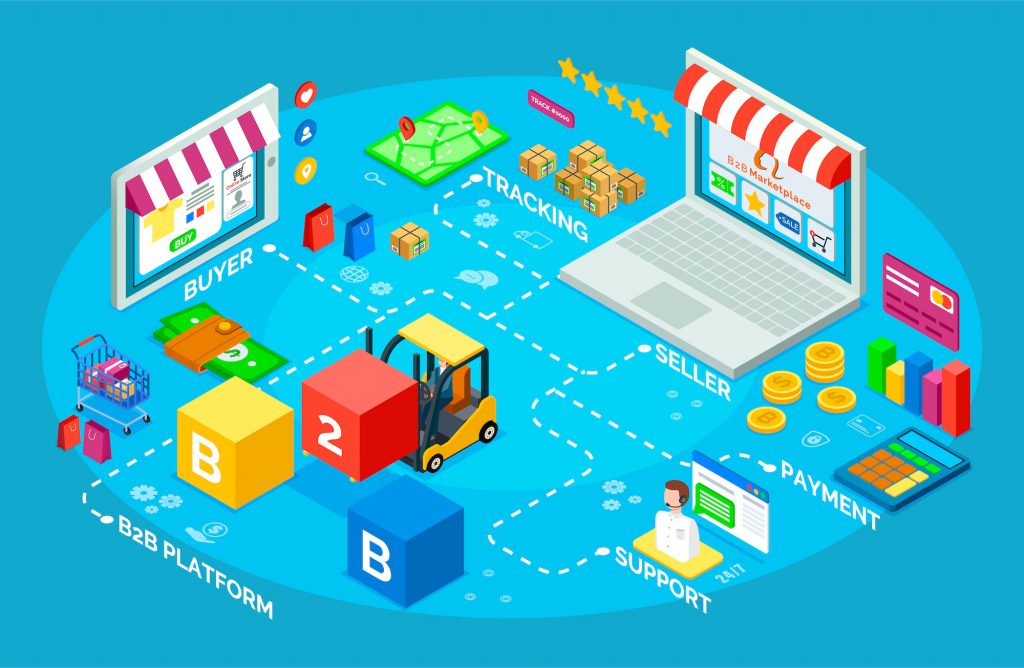
The B2B eCommerce market is huge. In fact, it was worth USD$6.64 trillion in 2020 and is expected to expand up to 18.7% CAGR from 2021 to 2028. In addition, statistics show that B2B eCommerce sales are projected to reach up to USD$1.2 dollars this year.
These statistics show that the B2B landscape is quickly shifting away from the traditional territory and into the eCommerce bandwagon.
Running a B2B eCommerce business can be challenging. Even more so if you don’t have the right tools. In order to build a comprehensive eCommerce store and stay competitive, you need to choose a comprehensive B2B eCommerce solution.
But how do you choose the right one? Here are key considerations you need to think about.
Offer A Variety Of Integrations
Most B2B eCommerce initiatives fail due to the lack of integration. There are plenty of B2B solution providers out there, offering “easy-to-install” plugins. However, most of these are not that “easy”.
Without a seamless integrations strategy to your backend systems such as your b2b marketing solution, product information management (PIM) system, enterprise resource planning (ERP) software, customer relationship management (CRM) technology, and payment gateways, a B2B eCommerce can’t provide real-time data that mainly fuels its uses and benefits.
A synchronized B2B eCommerce integration system ensures that all of your business data—from product inventory all the way to customer’s order data—is stored and accounted for in a single place. This allows data to be accessed easily by those who need it.
In addition, integrations also help avoid the long web development hours needed to connect your B2B platform with the specific tools needed to serve your customers better.
Supports B2B Workflow
You probably visited websites of certain platform providers with taglines like “complete B2B solution”. But if they say it, it doesn’t mean it’s true. And if you take a moment to explore their platforms, you’ll find out (most of the time) that they made a name providing platforms for B2C companies.
So, what’s the problem with that? Well, with a few tweaks and added features, some may be utilizing B2C technology and marketing them as B2B eCommerce solutions. Such solutions might fit your business requirements in the short term. But in the long-term, you might experience complications.
Preferably, you should look for specific B2B features when looking for the right solution:
- Quote request
- Dynamic pricing
- Quick order functionalities
- Inventory management
- Reorder capabilities
- Customer-segmented product catalogs
Your business needs may be unique in their own right; however, these features will always be a must-have for a B2B platform in order to support the common B2B workflow. Otherwise, you’ll be spending more on hiring developers in order to make some customizations on your platform.

Think Scalability And Customization
Any business wants to expand its current operations. And if you want a seamless expansion, you need a platform that can grow with your business and is robust enough to handle the increasing demand and features.
So, when looking for a B2B solution, you need to consider if the platform is built on a scalable architecture and can support your business’s future needs. Is the platform flexible or fast enough to support your future scaling requirements?
In terms of customization, you may want to look at the type of programming codes used. The source code often falls into one of two categories:
Proprietary
Think of the proprietary codes like a trade secret. The inner workings of the code are not open to the public. Solutions with proprietary codes are usually developed with a narrow target market. This means that customizing the solution will be restricted unless you employ the provider to do so.
Open Source
An open-source code means there are no trade secrets. These codes are freely available and allow for customization. The standards are open as well, which means integrating with other solutions is typically easy.
Where Will It Be Deployed?
You need to consider the type of deployment that will work best for your business. And there are two ways to do this:
Cloud-Based Deployment
A cloud-based B2B eCommerce solution is hosted and maintained by the cloud service providers. All data, applications, and programs are stored and can be accessed over the internet.
The most significant advantage of a cloud-based solution is that you don’t need to purchase and maintain data storage equipment. With cloud-based hosting, the service provider will be responsible for ensuring security data center management and networking functions.
You only need to get the computing storage and capacity you need at a given time. This allows you to scale up or down with your needs, making it the “right-sized” option.
On-Premise Deployment
This is the traditional way of handling eCommerce solutions. The platform is installed on a server located in your physical facilities with your IT infrastructure. A firewall protects and manages it.
This means that you have complete control over the platform as well as the contractors you choose to provide access to. When using an on-premise deployment, you pay for the license to use it or purchase the solution outright.
Take note, however, that this method can only be as secure as the facility and your IT staff makes it to be.
Strong Security
Data security is critical. A single data breach and you risk irreversible damage to your reputation and business as a whole.
With that said, it’s important that the B2B eCommerce platform you choose should have strong security in place and comply with security standards.
For instance, any eCommerce solution that allows you to handle credit card payments should be Payment Card Industry Data Security Standard (PCI DSS) compliant. It’s a way to ensure that your clients’ payment card information is secure when making a purchase.
Reliable Customer Service
Like any other technology, a B2B eCommerce platform is prone to malfunctioning, downtimes, and other technical issues which can be problematic for your business processes and sales revenues.
Does, when choosing a platform provider, make sure to look at their customer service. Make sure to analyze their level of customer support. Can you get support 24/7? How many levels of support do they offer? How quickly can you connect and talk to a representative?
Conclusion
Running a B2B eCommerce is complex and overwhelming. However, the right B2B eCommerce solution can make it easier to manage while providing the right things to your clients and customer, ultimately boosting brand experience.


